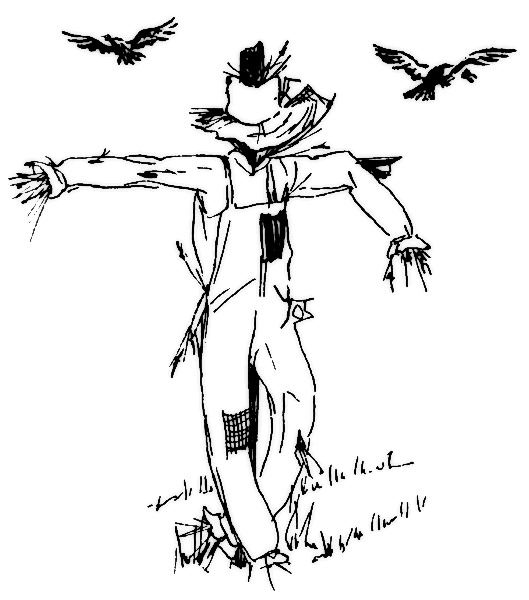"We are the hollow men
We are the stuffed men
Leaning together
Headpiece filled with straw. Alas!"
T. S. Eliot (1888 - 1965)
In The Hollow Men
T. S. Eliot explores what appear to be cyclic events in human history both in
tautology and monologue. The story of everyman parallels the modern men of
sanctimonious selfish ends of materialism. We are empowered by a powerful
magical incantation of spiritual bankruptcy. The importance of these
cyclic events is that they represent the repeated clashes between the powers of
good and evil that seems to be occurring on an escalating scale over time. Farther,
The Hollow Men presents nihilism, designation
applied to various radical philosophies, usually by their opponents, the
implication being that adherents of these philosophies reject all positive
values and believe in nothing.
The best-known poetic nihilist was The Waste Land and The Hollow Men goes very close to it. Here all possibility of orderly and
purposeful existence is challenged and was directly contrary to real human
needs and desires. Here manifestations of nihilism are expressed in the effigy
of the hollowness of ours.
Furthermore, T. S. Eliot makes the point that
salvation lies in the actions of individuals.
In the character of The Hollow Men, T.
S. Eliot has brought the mythical to life in the modern barren land of
waste land.
For this poem, T.S. Eliot claimed to have combined the
title of a poem by Rudyard Kipling (of The Jungle Book fame), The Broken
Men, with the title of story by a writer named William Morris, The
Hollow Land. He claimed, "I combined the two”.
An important connection of Mistah Kurtz—he dead might be Marlow 's description of the character Kurtz in Joseph Conrad's novella Heart of Darkness as
"hollow at the core” announcing Kurtz's death. Like that of Kurtz, we can
find out the route of anarchy in modern times.
The Hollow Men are the modern men. Their
hollowness is a sign that they lack a soul and other essential qualities of
being human. They are living dead with out any spiritual and aesthetic values. They are filled with straw like one of the
effigies and exist in a state that is less than fully real. Read
More Poetry
"A penny for the guy," is what kids in England
say on Guy Fawkes Day when begging for money to buy fireworks to burn or blow
up their straw effigies of Guy Fawkes. This tradition mimics Guy Fawkes, who
tried to blow up Parliament back in the day. These effigies were like dolls
filled with straw or another kind of stuffing.
The clearest
expression of the scarecrow-like features of The Hollow Men is evident in the
poem. They wear ragged clothes and stand in a field, supported by wooden poles
or "crossed staves." Spiritual and aesthetic bankruptcy of modern men
and their aimless behavior is compared using simile to the aimless motions of
the wind:
“Let me also wear
Such deliberate disguises
Rat's coat, crowskin, crossed staves
In a field
Behaving as the wind behaves
No nearer—”
The dryness of the
nature establishes that the Hollow Men live in a dry and barren world. The
speakers compare their "dried voices" to the "quiet" and
"meaningless" sound of "wind in dry grass." Also using
simile, they compare their voices to the sound of rats walking across broken
glass in a "dry cellar.":
“Alas!
Our dried voices, when
We whisper together
Are quiet and meaningless
As wind in dry grass
Or rats' feet over broken glass
In our dry cellar”.
Everything around the Hollow Men is broken – nothing is
complete. We wouldn't want to lend anything valuable to the Hollow Men or it
would probably come back broken. Images of broken objects symbolize the
fragmented spiritual condition of the Hollow Men. The phrase like ‘broken
glasses, ‘broken column’,’ broken stone’, ‘broken jaw’ clearly point out the
broken essence of our reality.
Here is "Death's dream kingdom" which probably
refers to Heaven, which the Hollow Men can only "dream" about and
never experience. Or maybe they think Heaven is like a pleasant dream.
In "The Hollow Men," T. S. Eliot masterfully weaves together tautology and monologue to explore the cyclical nature of human history. Through these techniques, he portrays the repetitiveness of human behavior, the futility of attempting to escape historical cycles, and the lingering sense of emptiness that pervades such endeavors. The poem serves as a powerful reflection on the nature of existence and the enduring patterns that shape human destinies.


Comments
Post a Comment
Drop any query, suggestion or comment here.